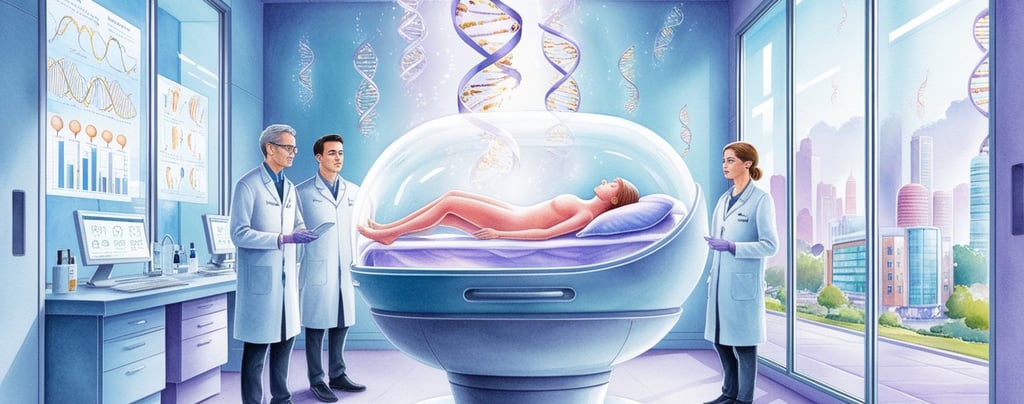Genetic Engineering and Immortality by 2025
Explore the potential of genetic engineering to enable immortality by 2025. Delve into cutting-edge science, ethical dilemmas, and the implications of 'living forever' on humanity and our world.
Black Heart
4/10/20253 min read


What If We Could Live Forever Using Genetic Engineering in 2025?
Introduction
I’ve always wondered, what if we didn’t have to age the way we do? What if gray hairs, wrinkles, and the slow march of time could all be hacked? With the rise of CRISPR, gene editing, and genetic engineering breakthroughs, scientists are now asking the same question: Could we use genetic engineering to live forever, or at least much longer, by 2025 and beyond?
Immortality might sound like science fiction, but when you look at the latest genetics research, it suddenly feels less like fantasy and more like a possibility creeping closer.
How Could Genetic Engineering Make Us Live Longer?
The idea is simple but powerful: if aging is caused by damaged DNA, shortened telomeres, and cellular breakdown, then genetic engineering could repair or reverse those processes.
I guess it would work like this:
Fixing faulty genes: Removing mutations that cause age-related diseases.
Telomere extension: Making chromosome “caps” longer so cells keep dividing.
Gene editing: Using CRISPR to “cut and paste” DNA for healthier aging.
Longevity genes: Activating genes linked to longer life in certain species.
Some scientists are already experimenting on mice, worms, and even monkeys, extending their lifespans by up to 50%. If it works in humans, we might be on the edge of redefining mortality itself.
Would Living Forever Be Possible, or Just Longer?
When people talk about immortality, it sounds like we’d never die. But realistically, I think genetic engineering might give us something in between. Maybe not eternal life, but:
Living 120–150 years in good health.
Avoiding diseases like cancer or Alzheimer’s.
Staying biologically “young” much longer.
So instead of immortality, think of it as radical life extension. Enough to feel like living forever compared to the current 70–90 years most people get.


Why Would We Want to Live Forever?
Honestly, the reasons are pretty tempting.
More time for life: Imagine learning multiple careers, exploring the world, or watching humanity colonize Mars.
Family continuity: Being around for future generations.
Scientific and cultural growth: A society with centuries of experience could achieve amazing things.
And on a personal level, I think the appeal is obvious; most of us just don’t want the story to end.
The Big “But”: Should We Live Forever?
Here’s the tricky part. Even if we could use genetic engineering to live forever, should we?
Overpopulation: If nobody dies, do we run out of space and resources?
Inequality: Would only the rich have access to genetic immortality?
Psychological burnout: Could our minds handle living for centuries?
The meaning of life: Does life lose urgency if it never ends?
It’s weird to think about, would birthdays still matter if you were on your 300th one?
Pros of Genetic Immortality
Defeats aging and many diseases.
Longer time for careers, learning, and relationships.
Potential to see human history unfold across centuries.
Scientific and cultural knowledge could skyrocket.
Cons of Genetic Immortality
It could cause massive inequality if access is limited.
Risk of overpopulation and environmental collapse.
Ethical debates over “playing God” with DNA.
Possible loss of purpose if life feels endless.


What If Only Some People Could Live Forever?
I think this is one of the biggest concerns. Imagine if billionaires or world leaders had access to life extension, but the rest of society didn’t. Power imbalances would grow like never before.
Would immortality become the ultimate luxury item? And if so, how would that reshape governments, economies, and even human relationships?
Would We Still Die?
Even if genetic engineering gave us biological immortality, we’d still face accidents, natural disasters, or violence. So in a way, we wouldn’t be truly immortal, we’d just dramatically reduce the chance of dying from aging itself.
Living forever might actually mean “living until something external ends your story.”
Key Points
Genetic engineering could slow or reverse aging by repairing DNA.
Real immortality may be unlikely, but extreme life extension is possible.
Pros: health, longevity, knowledge, cultural growth.
Cons: overpopulation, inequality, ethics, loss of meaning.
Even with “forever genes,” accidents and risks still exist.
The biggest question: should we pursue it, or let nature decide?
Final Thoughts
I think living forever with genetic engineering sounds both incredible and unsettling. On one hand, the dream of watching centuries unfold, of never having to say goodbye too soon, is powerful. On the other hand, I wonder if part of what makes life beautiful is its limited time.
By 2025, we might not have cracked full immortality, but we’re already moving closer to genetic life extension. Maybe the real question isn’t “Can we live forever?” but “What will we do with the extra time when we get it?”
🔗 Related Articles from EdgyThoughts.com
🌐 External Resource
Learn more here: Wikipedia – Genetic Engineering